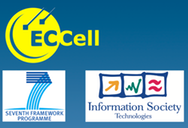Electronic chemical cells will solve the basic problems of decentralized and stable survival and manufacturing of functional information at the noisy microscopic level for immersed (=wet embedded) systems. This wet embedded environment is currently the place where, because of its biological importance, the highest density of information needs to be processed and functionally responded to. Currently, ICT is trying to manage this complexity without resource to similar modules with a massively parallel and reflexive combination of synthetic and information processing capabilities. As swarm intelligence, multiagent systems and other decentral software paradigms increase in effectiveness, the viability of large scale intercommunicating individuals for information processing will continue to increase. ECCell takes the approach of emulating via FPGA circuitry a significant fraction of the in future purely local information processing necessary to implement such modules : i.e. we give the electronic feedback loops the local properties it would have it were implemented by the chemical system itself (and make it evolvable via electronic genomes).
In earlier work such as the PACE project, it was envisaged that such units can provide a basis for building adaptive robots, and indeed we have shared the vision of the importance of embodiment and microscopically adaptive units in robotics. However, it is clear that the major bottleneck to adaptive systems at the microscopic level is stable and programmable synthesis and operation, rather than mobility. In a decentralized environment, synthetic stability is closely related to organizational closure as manifested by cells. This is the problem that ECCells, and the microscopic feedback loops which empower them, envisage solving. Already we are seeing increasing use of self-assembly paradigms in molecular information processing, both to build circuits and to perform computations (e.g. DNA self-assembly as advocated by Seeman, Rothemund and Winfree).
Not the brute force IT processing power, but the effective deployment of ECCells to direct complex chemical processes is the area where the ICT applications of ECCell will pay dividends.
